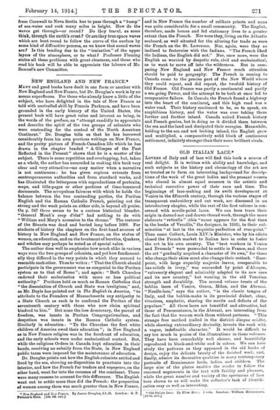NEW ENGLAND AND NEW FRANCE.* MANY and good books have
dealt in one form or another with New England and New France, but Dr. Douglas's work is by no means superfluone. For those who already know a little of the subject, who have delighted in the tale of New France as told with unrivalled skill by Francis Parkman, and have been grounded in this early history of the United States, the present book will have great value and interest as being, in the words of the preface, an "attempt candidly to appreciate and describe the spirit of the two groups of colonists who were contending for the control of the North American Continent." Dr. Douglas tells us that he has borrowed considerably from his own previous writings on New France, and the pretty picture of French-Canadian life which he has drawn in the chapter headed " A Glimpse of the Past Reflected in the Present" shows that he is a master of the subject. There is some repetition and overlapping, but, taken as a whole, the author has succeeded in making this book very clear and very attractive—no easy matter when a narrative is not continuous : he has given copious extracts from contemporaneous authorities and from standard works, and has illustrated the letterpress with reproductions of portraits, maps, and title-pages or other portions of time-honoured documents. The scrupulous fairness with which he holds the balance between the two contending parties, the Puritan English and the Roman Catholic French, pointing out the strong and the weak points on either side, is beyond all praise. On p. 347 there seems to be a curious historical blunder. "General Monk's coup cretat" had nothing to do with " William and Mary's accession to the throne." The restorer of the Stuarts was dead and buried long before 1688. For students of history the chapters on the first-hand sources of history in New England and New France, on the statue of women, on education, and on the treatment of heretics, Quakers, and witches may perhaps be noted as of special value.
The author does well to emphasize how much alike in various ways were the two groups of colonists, and yet how fundament- ally they differed in the very points in which they seemed to assemble each other. Thus he writes " That the Church should participate in the government was as congenial to the Puritan system as to that of Rome "; and again: "Both Churches endowed their ecclesiastics with more or less political authority." Puritans held as much as Roman Catholics that " the dissociation of Church and State was irreligious," and, as Mr. Doyle has pointed out in The English in America, "to attribute to the Founders of Massachusetts any antipathy to a State Church as such is to confound the Puritan of the seventeenth century with those who now claim spiritual kindred to him." But none the less democracy, the parent of freedom, was innate in Puritan Congregationalism, and despotism was innate in the Roman Catholic system. Similarly in education: "To the Churches the first white children of America owed their education "; in New England AB in New France religion was in the forefront of education, and the early schools were ender ecclesiastical control. But, while the religious Orders in Canada kept education in their hands, receiving no subsidy from the State, in New England public taxes were imposed for the maintenance of education.
Dr. Douglas points out how the English colonists settled and lived by the sea, showing no disposition to penetrate into the interior, and how the French fur traders and voyageurs, on the other hand, went far into the recesses of the continent, There were many reasons to account for this difference. The English went out to settle more than did the French : the proportion of women among them was much greater than in New France, • Nets England and Nee Plollet. By James Douglas, LL.D. London: 0. P. Putnam's Bons. [12s. 6d. net.) and in New France the number of celibate priests and nuns was quite considerable for a small community. The English, therefore, made homes and red stationary lives to a greater extent than the French. Nor were they, living on the Atlantic seaboard, as well situated for the alluring fur trade as were the French on the St. Lawrence. Nor, again, were they so inclined to fraternize with the Indians. "The French liked the Indians, the English did not." Nor, once more, were the English so worried by despotic rule, civil and ecclesiastical, as to want to move off into the wilderness. But in com- paring New England and New France much attention should be paid to geography. The French in coming to Canada came to the precise part of the New World where they could repeat, and did repeat, the twofold history of Old France. Old France was partly a continental and partly a sea-going Power, and the attempt to be both at once led to comparative failure. In Canada the French found a highway into the heart of the continent, and this high road was a water road. Their history continued to be, so to speak, an amphibious history, and the water was ever taking them further and further inland. Canada suited French history and French genius, but in doing so it divided them between the sea and the land and dissipated their energies. Meanwhile, holding to the sea and not looking inland, the English grew and multiplied, a comparatively solid block• of continuous settlement, infinitely stronger than their more brilliant rivals.






































 Previous page
Previous page